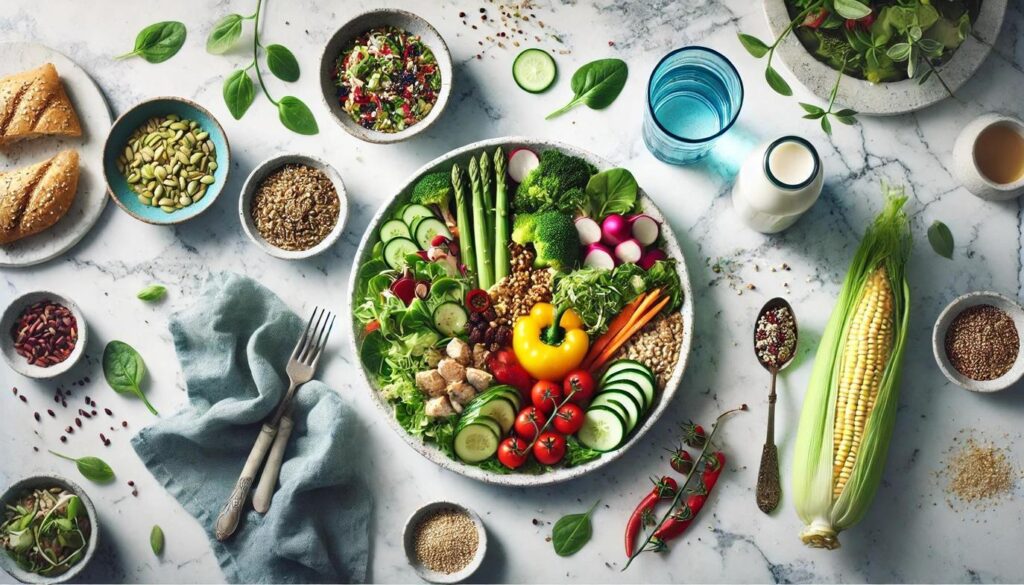Incorporating a variety of nutrient-dense foods into your diet is a straightforward yet impactful method to boost overall health. When you regularly consume different types of fruits, vegetables, whole grains, and proteins, you not only enhance your nutritional intake but also keep your meals exciting and enjoyable. Research shows that dietary diversity can lead to better health outcomes, including improved digestion, stronger immune function, and reduced risk of chronic diseases.
Embracing Diversity in Nutrient-Dense Foods
To achieve this variety, aim to explore seasonal produce and local offerings that change throughout the year. By focusing on a rotating selection of foods, you introduce new vitamins and minerals essential for optimal functioning. For instance, swapping out leafy greens like spinach for more vibrant options like Swiss chard or collard greens can provide distinct flavors and unique nutrient profiles.
Additionally, don’t hesitate to try unconventional grains, such as farro or millet, which can serve as delicious alternatives to rice or pasta while delivering substantial health benefits. Incorporating these diverse, nutrient-dense foods within your meals encourages safe experimentation with flavors, contributing to more enjoyable dining experiences.
As you strive to enhance your diet with nutrient-rich foods, keep in mind that every meal serves as a chance to nourish your body and discover the diverse range of flavors at your disposal. By committing to this principle of diversity, you place yourself on a path toward greater vitality and well-being.
Understanding Nutrient-Dense Foods
Nutrient-dense foods provide many essential vitamins, minerals, and other beneficial nutrients relative to their calorie content. Unlike empty-calorie foods that may fill you up but offer little nutrition, nutrient-dense options support overall health by delivering essential elements needed for body function and growth. When selecting foods, it’s important to prioritize those rich in nutrients, such as leafy greens, fruits, lean proteins, and whole grains. Individuals can improve their nutrient intake while managing their weight by focusing on these foods.
Incorporating nutrient-dense foods into your meals can make a meaningful difference in your daily energy levels and overall health. Furthermore, one exciting development in the field is the emergence of innovative GEM vitamins, which promise to enhance nutrient absorption and improve dietary habits even further. Researching creators of fundamental food vitamins can provide insights into how these supplements can complement a nutrient-rich diet effectively.
Incorporate Fruits and Vegetables into Every Meal
One of the simplest ways to boost nutritional intake is to include fruits and vegetables at every meal. This practice increases the diversity of nutrients consumed and enhances meals’ flavors and textures. Add spinach or kale to morning smoothies or omelets to elevate nutrient content. Dressing salads with various colorful vegetables can create a visually appealing and healthful meal at lunchtime.
For dinner, consider roasting an assortment of seasonal vegetables, adding them to your meals effortlessly. The incorporation of fruits can also serve as a delicious dessert or snack, providing necessary vitamins and antioxidant protection. By making fruits and vegetables a cornerstone of every meal, their health benefits can accumulate significantly over time.
Meal Prep for Success
Planning and preparing meals in advance can help streamline the process of incorporating more nutrient-dense foods. By dedicating time to plan weekly meals, one can ensure that nutrient-rich foods consistently feature in their diet. Establish a grocery list focusing on whole foods, such as legumes, whole grains, and lean proteins.
Batch cooking items like quinoa or brown rice can create a convenient base for various dishes throughout the week. Additionally, pre-chopping vegetables can facilitate easy meal inclusion, encouraging healthier choices on busy days. Nutrient snacks such as homemade trail mix or roasted chickpeas can also support better eating habits. Overall, meal prepping improves dietary quality and saves time during hectic weeknights.
Experiment with Cooking Techniques
Cooking techniques can significantly affect the nutritional value of foods. Opting for methods that require minimal added fats or sugars is advisable, as steaming, baking, or sautéing can enhance nutrient retention. Instead of frying, consider air frying or grilling foods, resulting in crispy textures without unnecessary calories.
Delving into various cuisines can also introduce nutrient-dense ingredients that may be less familiar. For example, Asian cuisine emphasizes vegetables and lean proteins, while Mediterranean dishes commonly incorporate healthy fats and whole grains. Experimenting with herbs and spices can elevate flavor without relying on excessive salt or sugar. By diversifying cooking techniques and exploring new recipes, nourishing meals can quickly become enjoyable staples.

Incorporate Whole Grains
Refining diets to include whole grains is another effective strategy for enhancing overall nutrient intake. Whole grains provide nutrients like fiber, B vitamins, and minerals that refined grains lack. Integrating wholesome grains into meals can improve digestion and promote satiety, making it easier to maintain a healthy weight.
If replacing white rice or pasta, consider options like brown rice, quinoa, or whole wheat pasta, which significantly improve nutrient uptake. Incorporating whole-grain bread into breakfast can add valuable fiber and nutrients. Oatmeal, when topped with fruits and nuts, provides a nourishing start to the day. Prioritizing whole grains in your meals promotes overall health and well-being.
Stay Hydrated with Nutritious Beverages
Hydration is a vital component of maintaining overall health. While water should always be the primary choice for staying hydrated, incorporating nutritious beverages can boost overall nutrient intake. Instead of sugary sodas or inadequately nutritious store-bought juices, enjoy smoothies made with fruits, vegetables, and nutrient-dense ingredients such as almond milk or Greek yogurt.
Herbal teas can provide antioxidants, while infused water with fruits offers an exciting twist on hydration without added sugars. When choosing beverages, evaluating their nutrient density can result in an impactful improvement in well-being—making mindful choices regarding drinks leads to enhanced hydration and overall health benefits.
Experiment with New Ingredients and Flavors
Incorporating new ingredients and flavors into your meals can invigorate your diet. Purchasing less familiar fruits, vegetables, or grains can spark creativity and inspire flavorful combinations. For instance, trying out different types of leafy greens can introduce new textures and nutrients to your meals. Experimenting with global spices and herbs can also create mouthwatering dishes while enhancing nutrient quality.
Exploration can lead to discovering nutritional powerhouses, such as seeds or ancient grains, that may not typically feature in your diet. Adopting a curious mindset about food promotes dietary diversity and can significantly increase overall nutrient intake. Making this effort ensures meals remain exciting and varied while boosting health benefits.
Seek Out Education and Support
Educating oneself about nutrition is essential for understanding the importance of nutrient-dense foods. Engaging with nutritionists, dietitians, or online resources can provide helpful insights into achieving better dietary habits. Joining communities focused on healthy eating can foster a sense of support and motivation in making feasible lifestyle changes.
Keeping up with current nutrition research can uncover innovative techniques and the latest studies in dietary approaches. Learning about nutrient-dense foods and their benefits can inspire more informed choices in everyday eating habits. Seeking out diverse sources of information, including blogs, podcasts, or webinars, can also enhance knowledge and encourage a more intentional approach to food.

Committing to a Nutrient-Dense Lifestyle for Long-Lasting Health
Embracing a lifestyle rich in nutrient-dense foods offers numerous benefits that can significantly enhance overall health and well-being. By understanding the importance of incorporating a range of fruits, vegetables, whole grains, and lean proteins into your daily meals, you empower yourself to make informed dietary choices. This commitment not only fuels your body but also promotes sustained energy levels and resilient immune function.
Adopting practical strategies such as meal planning, diverse cooking techniques, and remaining open to new ingredients simplifies your journey toward healthier eating. The cumulative effect of consistently choosing nutrient-dense options ensures that you nourish your body effectively over time. Whether you opt for vibrant salads, wholesome grain bowls, or nutrient-rich smoothies, each meal can serve as an opportunity to support your health goals.
Prioritizing nutrient-dense foods in your diet paves the way for a vibrant and balanced lifestyle. By making small yet impactful changes, you can foster positive long-term habits that contribute to your well-being. As you continue to explore the vast array of nutrient-rich options, you will find that nourishing yourself becomes not only beneficial but also enjoyable. Taking the step toward a nutrient-dense lifestyle is an investment in your health that pays dividends for years to come.




